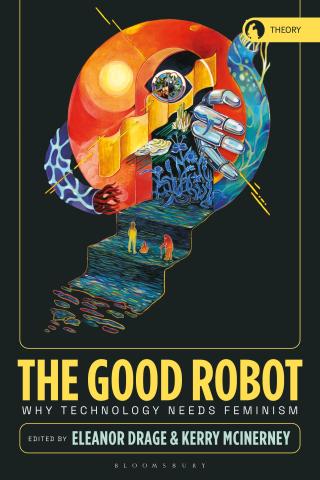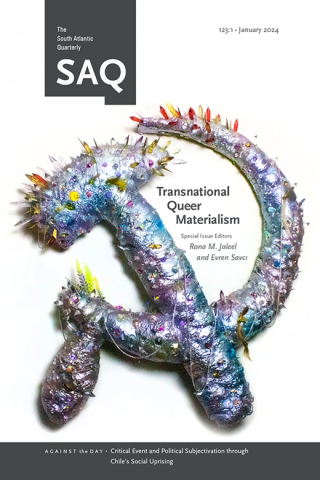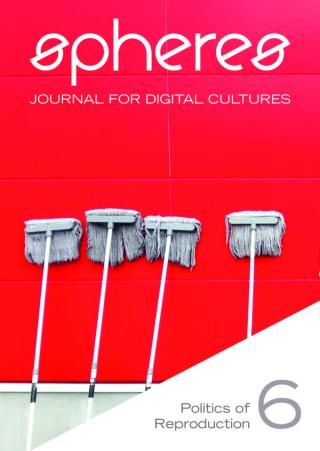Neda Atanasoski

Professor and Chair, The Harriet Tubman Department of Women, Gender, and Sexuality Studies
3121 Susquehanna Hall
Get Directions
Education
Ph.D., Literature and Cultural Studies, University of California San Diego
Research Expertise
Critical Race Theory
Cultural Studies
Decolonial Feminisms
Feminist Science Studies
Media Studies
Postcolonial Feminisms
Transnational Feminisms
Visual Culture
Neda Atanasoski is Professor and Chair of the Harriet Tubman Department of Women, Gender and Sexuality Studies at the University of Maryland, College Park and Associate Director of Education for the Artificial Intelligence Interdisciplinary Institute at Maryland (AIM). Atanasoski’s interdisciplinary research has focused on feminism and AI, feminist and critical race approaches to science and technology studies, AI and the future of work, militarism, and human rights and humanitarianism. She is the author of Humanitarian Violence: The U.S. Deployment of Diversity (2013), co-author of Surrogate Humanity: Race, Robots, and the Politics of Technological Futures (2019), and co-editor of Postsocialist Politics and the Ends of Revolution (2022) and Technocreep and the Politics of Things Not Seen (2025). She serves on the editorial collective of the journal Critical Ethnic Studies, the flagship journal of the Critical Ethnic Studies Association. Atanasoski has been the recipient of numerous grants, including the Mellon Affirming Multivocal Humanities Grant, the University of California Multicampus Program Initiative Grant, the Luce Foundation Humanities Studio Grant, the University of California Humanities Research Institute Working Group Grant, and the Center for New Racial Studies Research Grant. Atanasoski has also held a number of fellowships and visiting professorships, including the Mercator Visiting Professorship of AI in the Human Context at the Center for Science and Thought at the University of Bonn, the GEXcel International Collegium for Advanced Transdisciplinary Gender Studies Visiting Research Fellowship in Sweden, the UC Humanities Research Institute Residential Fellowship at UC Irvine, the Hellman Foundation Fellowship, and the UC President’s Postdoctoral Fellowship at UC Berkeley. Previously, Atanasoski was Professor of Feminist Studies and Critical Race and Ethnic Studies and the founding co-Director of the Center for Racial Justice at The University of California at Santa Cruz.
Digital
Fungal Futures
Interplanetary fungal networks
Author/Lead: Neda AtanasoskiNon-ARHU Contributor(s): Felicity Amaya Schaeffer, Professor of Feminist Studies and Critical Race and Ethnic Studies, UC Santa Cruz
Part of a collection through the Berggruen Institute, Fungal Futures is one of eleven works in a collection of relics posting specualtive answers to the question, "What will life become?" Fungal Futures explores a future in which astrobiologists work to program fungi with the hope of creating an environment for life on Mars through the recorded journal entries of one of these scientists.
Publications
Technocreep and the Politics of Things Not Seen
Neda Atanasoski releases new co-edited volume with Nassim Parvin
Author/Lead: Neda AtanasoskiNon-ARHU Contributor(s): Nassim Parvin, Associate Professor, University of Washington Information School
New and emerging technologies, especially ones that infiltrate intimate spaces, relations, homes, and bodies, are often referred to as creepy in media and political discourses. In Technocreep and the Politics of Things Not Seen, Neda Atanasoski and Nassim Parvin introduce a feminist theory of creep that they substantiate through critical engagement with smart homes, smart dust, smart desires, and smart forests toward dreams of feminist futures. Contributing authors further illuminate what is otherwise obscured, assumed, or dismissed in characterizations of technology as creepy or creeping. Considering diverse technologies such as border surveillance and China’s credit system to sexcams and home assistants, the volume’s essays and artworks demonstrate that the potentials and pitfalls of artificial intelligence and digital and robotic technologies cannot be assessed through binaries of seeing/being seen, privacy/surveillance, or harmful/useful. Together, their multifaceted and multimodal approach transcends such binaries, accounting for technological relations that exceed sight to include touch, presence, trust, and diverse modes of collectivity. As such, this volume develops creep as a feminist analytic and creative mode on par with technology’s complex entanglement with intimate, local, and global politics.
Featuring contributions from Neda Atanasoski, Katherine Bennett, Iván Chaar López, Sushmita Chatterjee, Hayri Dortdivanlioglu, Sanaz Haghani, Jacob Hagelberg, Jennifer Hamilton, Antonia Hernández, Marjan Khatibi, Tamara Kneese, Erin McElroy, Vernelle A. A. Noel, Jessica Olivares, Nassim Parvin, Beth Semel, Renee Shelby, Tanja Wiehn
Postsocialist Politics and the End of Revolution
"Postsocialism and the Politics of Dissent" redefines the study of socialism by exploring its decolonial and antiracist dimensions beyond state socialism. This anthology connects the legacies of socialist projects across regions like the Middle East, Scan
Author/Lead: Neda Atanasoski
Moving past the conflation of state socialism with all socialist projects, this book opens up avenues for addressing socialist projects rooted in decolonial and antiracist politics. To that end, this anthology brings together scholarship across regions that engages postsocialism as an analytic that connects the ‘afters’ of the capitalist– socialist dynamic to present day politics. Resisting the revolutionary teleology of what was before, “postsocialism” can function to create space to work through ongoing legacies of socialisms in the present.
Looking at the Middle East, Scandanavia, Korea, Romania, China, and the US, the chapters in this book assess ongoing socialist legacies in new ethical collectivities and networks of dissent opposing state- and corporate- based military, economic, and cultural expansionism since the end of the Cold War.
The majority of the chapters in this book were originally published as a special issue of the journal, Social Identities.
Good Technology is a Portal to Other Worlds
Neda Atanasoski's essay appears in The Good Robot
Author/Lead: Neda AtanasoskiNon-ARHU Contributor(s): Felicity Amaya Schaeffer, UC Santa Cruz

What is good technology? Is 'good' technology even possible? And how can feminism help us work towards it? The Good Robot addresses these crucial questions through the voices of leading feminist thinkers, activists and technologists. Each thinker provides a snapshot of key challenges, questions and provocations in the field of feminism and technology.
While the question of whether various AI and technological advances can be ethical is not new, the embedded nature of feminist perspectives pulls out whether this perceived 'goodness' or 'wrongness' might actually impact our lives in the 21st century. This book explores both the radical possibilities of technology to disrupt practices of patriarchy, colonialism, racism and beyond but also provides a significant critique of how we can contain the ethical possibilities of entities we cannot predict. In exploring unjust technological practices and engaging critical voices in the tech industry, the existing moral issues are brought to light as well as the possible ethical quagmires.
This book opens a new space of discussion on digital technologies – one that insists that the future of AI is an urgent feminist issue.
This chapter can be found in Part IV: Good Visions, Chapter 15 and was written in collaboration with Felicity Amaya Schaeffer
Reproducing Racial Capitalism: Sexual Slavery and Islam at the Edges of Queer of Color Critique
Dr. Atanasoski publishes new article with Dr Rana Jaleel in South Atlantic Quarterly
Author/Lead: Neda AtanasoskiNon-ARHU Contributor(s): Rana M. Jaleel, Cultural Studies Chair, Associate Professor, University of California Davis

This article tracks contemporary debates surrounding human trafficking, sex slavery, and the slave trade, in which the specter of the Ottoman empire and its system of slavery—as well as other “Oriental” slave systems—emerge as templates for imagining the place of sex in slavery. At the same time, the authors highlight how Ottoman and “Oriental” slavery is largely considered irrelevant to the genealogy of present‐day racial capitalism. By contrast, the authors argue that considering historically parallel and entangled slave systems is important not just to accounts of modern‐day slavery but also for how we conceptualize the “racial” in racial capitalism and the “queer” and “of color” in queer of color critique. Building on Black feminist historiography on the transatlantic slave trade, the commitments of queer of color critique, and contemporary research concerning sexual violation and racial capitalism, the authors explore how interconnected struggles across the globe are partitioned by imagined frameworks of racial and sexual difference that isolate entangled systems of gendered and sexual enslavement.
Postsocialist Politics and the Ends of Revolution
Dr. Atanasoski's 2022 coedited anthology on post-socialism examines the ongoing transnational legacy of socialism
Author/Lead: Neda AtanasoskiNon-ARHU Contributor(s): Kalindi Vora is Professor of Ethnicity, Race and Migration, and of Women's Gender and Sexuality Studies, History of Science and Medicine, and American Studies at Yale University. She is author of Life Support: Biocapital and the New History of Outsourcing, Reimagining Reproduction: Essays on Surrogacy, Labor and Technologies of Human Reproduction, and co-author of Surrogate Humanity: Race, Robots, and the Politics of Technological Futures. With the Precarity Lab, she is author of Technoprecarious.

Moving past the conflation of state socialism with all socialist projects, this book opens up avenues for addressing socialist projects rooted in decolonial and antiracist politics. To that end, this anthology brings together scholarship across regions that engages postsocialism as an analytic that connects the ‘afters’ of the capitalist– socialist dynamic to present day politics. Resisting the revolutionary teleology of what was before, “postsocialism” can function to create space to work through ongoing legacies of socialisms in the present.
Looking at the Middle East, Scandanavia, Korea, Romania, China, and the US, the chapters in this book assess ongoing socialist legacies in new ethical collectivities and networks of dissent opposing state- and corporate- based military, economic, and cultural expansionism since the end of the Cold War.
The majority of the chapters in this book were originally published as a special issue of the journal, Social Identities.
Why the Sex Robot Becomes the Killer Robot: Reproduction, Care, and the Limits of Refusal.
Neda Atanasoski's article published in the Spheres: Journal for Digital Cultures is co-authored by Kalindi Vora.
Author/Lead: Neda AtanasoskiNon-ARHU Contributor(s): Kalindi Vora, Professor of Gender, Sexuality and Women’s Studies at UC Davis, and Director of the Feminist Research Institute

To answer how sex, reproduction, and labor are co-articulated in robotics technologies that perpetuate capitalist racial and colonial modes of expansion and acceleration, this article examines how the category of ‘reproductive labor’ can be brought to bear upon fantasies of sex robotics and non-sex robotic projects that are about robot reproduction. As Neda Atanasoski and Kalindi Vora have argued elsewhere, technologies that perform labor in place of humans (including sex work) still have a human cost, despite a resolute desire to see technology as magical rather than the product of human work. This is because technoliberalism – the investment in technological futures that reaffirm the subject, political economy, and social life of the present – obscures the actual labor, now unrecognized either as human-performed or even as labor, required to support robotic activity.
Surrogate Humanity Race, Robots, and the Politics of Technological Futures
In Surrogate Humanity Neda Atanasoski and Kalindi Vora trace the ways in which robots, artificial intelligence, and other technologies serve as surrogates for human workers within a labor system entrenched in racial capitalism and patriarchy.
Author/Lead: Neda AtanasoskiNon-ARHU Contributor(s): Kalindi Vora
Analyzing myriad technologies, from sex robots and military drones to sharing-economy platforms, Atanasoski and Vora show how liberal structures of antiblackness, settler colonialism, and patriarchy are fundamental to human---machine interactions, as well as the very definition of the human. While these new technologies and engineering projects promise a revolutionary new future, they replicate and reinforce racialized and gendered ideas about devalued work, exploitation, dispossession, and capitalist accumulation. Yet, even as engineers design robots to be more perfect versions of the human—more rational killers, more efficient workers, and tireless companions—the potential exists to develop alternative modes of engineering and technological development in ways that refuse the racial and colonial logics that maintain social hierarchies and inequality.
Humanitarian Violence The U.S. Deployment of Diversity
Exploring the transition from the old imperialism based on race to the new imperialism based on diversity.
Author/Lead: Neda AtanasoskiHumanitarian Violence considers U.S. militarism—humanitarian militarism—during the Vietnam War, the Soviet-Afghan War, and the 1990s wars of secession in the former Yugoslavia. Neda Atanasoski reveals a system of postsocialist imperialism based on humanitarian ethics, identifying a discourse of race that focuses on ideological and cultural differences and makes postsocialist and Islamic nations the targets of U.S. disciplining violence.
Talk
Artificial General Intelligence and the Reproduction of Power: Feminist Interventions in the Politics of LIfe
Keynote presented at the University of Applied Arts in Vienna, Austria
Author/Lead: Neda AtanasoskiThis talk examines seemingly opposed perspectives surrounding Artificial General Intelligence (AGI): its framing as a "New Manhattan Project" driven by geopolitical competition and fears of annihilation, and its reinterpretation by some as an expansion of the definition of life itself. The presentation argues that both narratives, despite their apparent opposition, are deeply intertwined with and perpetuate gendered, racial capitalist and colonial relations. The talk suggests that the push for AGI, whether for global supremacy or a redefinition of life, obscures ongoing exploitation and reinforces existing power structures, underscoring the need for feminist understandings of life and living.
For more information on the conference, please visit the University of Applied Arts's Critical AI: Rethinking Intelligence, Bias, and Control conference's webpage.
Technologies, Their Creepiness & Desirable Futures - Feminist Insights
Workshop presentation at the Technological Futures Now Conference at the University of Bonn
Author/Lead: Neda AtanasoskiHosted by the Feminist AI Network, this Workshop was part of the Conference Technological Futures Now at CST.
Neda Atanasoski will present the new book she edited together with Nassim Parvin: "Technocreep and the Politics of Things Not Seen". From the book description:
New and emerging technologies, especially ones that infiltrate intimate spaces, relations, homes, and bodies, are often referred to as creepy in media and political discourses. In Technocreep and the Politics of Things Not Seen Neda Atanasoski and Nassim Parvin introduce a feminist theory of creep that they substantiate through critical engagement with smart homes, smart dust, smart desires, and smart forests toward dreams of feminist futures. Considering diverse technologies such as border surveillance and China’s credit system to sexcams and home assistants, the volume’s essays and artworks - including contributing authors - demonstrate that the potentials and pitfalls of artificial intelligence and digital and robotic technologies cannot be assessed through binaries of seeing/ being seen, privacy/surveillance, or harmful/useful. Together, their multifaceted and multimodal approach transcends such binaries, accounting for technological relations that exceed sight to include touch, presence, trust, and diverse modes of collectivity. As such, this volume develops creep as a feminist analytic and creative mode on par with technology’s complex entanglement with intimate, local, and global politics.
This workshop will be hosted by the Feminist AI Network as part of the Conference Technological Futures Now.
Read More about Technologies, Their Creepiness & Desirable Futures - Feminist Insights
AI Between Annihilation and Life - Keynote
Keynote Mercator Lecture for AI
Author/Lead: Neda AtanasoskiKeynote Mercator Lecture at the Center for Science and Thought at the University of Bonn during the symposium titles "Technological Futures Now. Racism, Imperialism and the Surrogate Human Effect"
Abstract: AI Between Annihilation and Life. This talk examines seemingly opposed perspectives surrounding Artificial General Intelligence (AGI): its framing as a "New Manhattan Project" driven by geopolitical competition and fears of annihilation, and its reinterpretation by some as an expansion of the definition of life itself. The presentation argues that both narratives, despite their apparent opposition, are deeply intertwined with and perpetuate racial capitalist and colonial relations. By tracing the historical legacy of the original Manhattan Project, including land appropriation and environmental devastation, the talk reveals how existing infrastructures are being repurposed for AI development, exacerbating energy consumption and climate concerns. Ultimately, the talk suggests that the push for AGI, whether for global supremacy or a redefinition of life, obscures ongoing exploitation and reinforces existing power structures, underscoring the need for alternative understandings of life and living.



